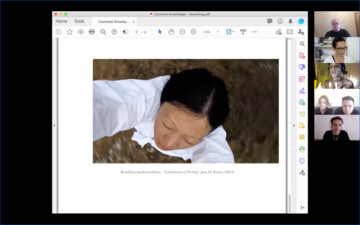The Forest Curriculum is an itinerant system of knowledge production and circulation that works with academics, film-makers, artists, musicians, activists, students, local stakeholders and non-human agents to produce systems of sharing located knowledges, organised around the issues of a particular location and field of operation. We seek to develop strategies and methods with which to build a collectively habitable future, in tune with a plurality of nature-cultures, rethinking systems of governance and logistics, social and political organisation that have produced and sustain our current → ecological crises. Thinking towards new worlds to come requires the production of new tools and forms of engagement, and new forms of commoning and collectivity, beyond mere critique, with the understanding that our futures must be collectively assembled.
The Forest Curriculum is critical of the prevalent discourse on sustainability under neo-liberal capitalism, which primarily leads to green-washing and the outsourcing of exploitation, which is thus kept out of sight. Indeed, these discourses are often deeply exclusionary, along racial, national, economic, and other lines, as if those who find themselves marginalised in these categories do not in fact deserve to inhabit the future, and are somehow responsible for its slow cancellation. Instead, we seek to develop an alternative vision of possible forms of existence, and of logistical and infrastructural imaginaries. To do so, is to understand the multi-scalar natures of mutual entanglements, and to develop frameworks that allow for more radical redistributions.
It is on this basis that we propose “rewilding” as a strategy, and as one that could animate the conception of practice. Rewilding has long been associated with post-disaster zones – think Chernobyl, Fukushima, or even the DMZ between North and South Korea – and it has also gained currency in the context of the pandemic, with inane, and insidious, posts on social media about “nature healing”, a deeply eco-fascist position. We propose the concept in an entirely different register: for us, it is not a return to a pristine wilderness, but an enfolding of time as it passes through nature. Rewilding recognises ecology’s ever-transformative relationships, the physical environment’s shifting equations with a whole gamut of inter-related species. It moves beyond the domains of toxicity, between the dualities of purity and impurity, and of how we → negotiate them. As Anna Tsing reminds us, the rewilded landscape, languorously expanding with shrubs and creepers, is made up of regions of fertility and growth, and is not one of economy and expansion. Rewilding challenges claims of authenticity, of describing what once truly was, one imagined state that has to be returned to, moving beyond singular, molar notions of identity, of belonging. There is no purity to return to, for there was never a purity to begin with.
We thus propose rewilding as a method that allows us to move toward → non-extractivist relationalities. It de-centres the agency of “Man” – long understood as white, reproductive, landed, capitalist, etc – and opens up space wherein we may understand ourselves always already moved by other agential relationalities. Rewilding as a method moves us away from neo-liberal ideologies of endless growth and opens up space for social, ecological and political possibilities. It is not a simple giving over to nature, of letting the forests “return”, but an act of fundamental re-attunement: of moving beyond building closed extractivist systems, but instead moving in assemblages of human-non-human collectivities. How do we imagine a future of labour when we move with the rhythms of mushrooms? How do we imagine identity and citizenship from the forest? How might we (re-)attune ourselves to the multiple cosmologies that we inhabit and cross over, with their spirits, ghosts, and other non-human beings? It is with these questions and more animating us that we propose to imagine rewilding as a critical curatorial and methodology.


![Subjectivisation 2 [Discussion #1]](/website/var/tmp/image-thumbnails/0/1462/thumb__logo/Discussion-1.png)
![Subjectivisation 2 [Final discussion]](/website/var/tmp/image-thumbnails/0/1478/thumb__logo/Mick-final-discussion.png)
